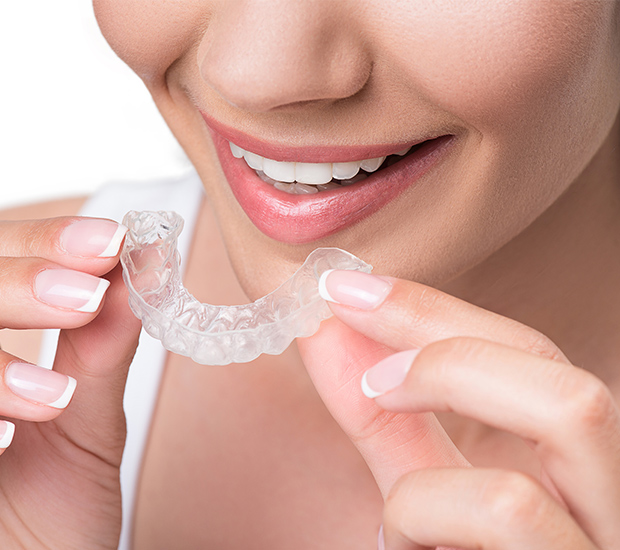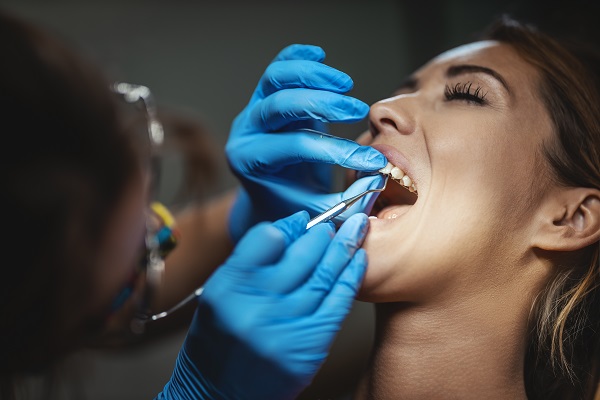Clear Aligners Wilmington, DE
Straightening teeth can be beneficial for more than just the overall appearance of one’s teeth. By straightening teeth, patients also gain health benefits from teeth that do not have as many places to trap food in them as crooked teeth. However, many patients do not prefer the obvious and cumbersome metal braces that they have to wear in order to straighten their teeth. Fortunately, we offer clear aligners as an alternative to braces that are just as effective. Patients will be able to benefit from wearing clear aligners while also straightening their teeth in a discreet manner. Clear aligners are an efficient alternative to traditional braces. Here are a few key factors that people need to understand about clear aligners.Request An Appointment
Removable and nearly invisible
Clear aligners are the preferable choice for many patients since they are removable and are not obvious to other people. The clear aligners come in a set, with each aligner being at a different position that gradually pushes the teeth into the proper position. The aligners consist of a clear plastic material that does not change the color of the teeth and will only be noticeable when the wearer tells someone to look at the teeth up close. With the discreet appearance, patients will not need to feel self-conscious about wearing clear aligners. Before patients begin the process, we will need to take molds and measurements of the patient’s teeth. We will then send this data to the lab and measure out the treatment plan. For the treatment plan, the patient will wear different clear aligners every two weeks or so and move onto the next pair. With this process, the patient will only feel pain for the first day or so and will have straight teeth before they know it. Clear aligners are also removable but need to stay in the patient’s mouth for at least 22 hours a day. If the patient needs to remove the aligners to eat or to play a sports game, then he or she just needs to place them back in as soon as possible. When eating, patients will remove the aligners and return them to the mouth once they finish eating and clean their mouth out. People may also remove the aligners for an important meeting, presentation, date or to take photos. Below are a few factors that patients need to keep in mind when they are wearing clear aligners.Not for kids
Clear aligners are not always the best treatment for children or children in their early teens. Since clear aligners require more responsibility to care for, children are not always responsible enough to take proper care of them. In many cases, a child may remove the clear aligners for lunch and then throw them out with the lunch bag by accident. The child may also have trouble remembering to remove the aligners to brush his or her actual teeth each night and then replace the aligners. Since they require more care, we recommend that children stick to braces until they are more responsible.Clear says it all
While clear aligners are great for being a discreet straightening option, patients need to clean their teeth after each meal before placing the aligners back in. Patients remove the clear aligners to eat or drink and then must replace the aligners. However, if one does not clean his or her teeth before replacing the aligners, then there is a good chance that the food will be visible in the aligners. Thus, we recommend that patients strive to brush or at least rinse the mouth with water after every meal.Don’t take them out for too long
While clear aligners are removable and the patient needs to take them out for certain situations, the patient needs to put them back in fairly quickly. With braces, the patient does not have the option to remove them and does not interrupt the overall straightening process. However, removing the aligners for too long can cause the teeth to begin to return to their old position. The longer a patient removes the clear aligners for, the longer the treatment can take overall. Therefore, it is best to only remove the clear aligners for a certain amount of time before returning them to the mouth.Call our office today
If you are interested in clear aligners or need us to replace some lost aligners, give us a call to schedule an appointment. We will go over options and determine if clear aligners are the best treatment for straightening your teeth. Give us a call at (302) 652-2451 today.Questions Answered on This Page
Q. Can I remove clear aligners when I want?
Q. What are the aligners made of?
Q. Can my child use clear aligners?
People Also Ask
Q. Why should I consider dental cosmetics?
Q. What are the most common cosmetic dental treatment services?
Definition of Invisalign® Terminology
- Aligner Trays
- With Invisalign® treatment, the patient will receive a series of aligner trays and swap out each one for the next one in the series every two weeks in order to gradually straighten the teeth.
- Blue Compliance Indicator (Invisalign® Teen)
- The blue compliance indicator is a small blue dot on the aligners that will fade from blue to clear in order to indicate if the patient is wearing the aligner for the proper amount of time and where the patient is in the Invisalign® process.
- ClinCheck® Software
- ClinCheck® software allows professionals to map out the straightening process the patient’s teeth will go through with Invisalign® in great detail.
- Gum Line
- The gum line is the line in the mouth where the teeth and gums meet. If a patient struggles with gum recession, then the gum tissue around the teeth may begin to wear away.
- Incisal Ridges
- Incisal ridges are the portion of the crown of the tooth that makes up the incisal portion and can be a direct cause of overbite if they are extended too far.
- iTero Element® Scanner
- An iTero Element® scanner allows professionals to create a 3D image of the patient’s teeth in minutes and predict what it will take to move the teeth into proper alignment.
- Malocclusion
- Malocclusion is the condition in which the upper and lower teeth do not meet properly when the bite is closed. Conditions of malocclusion can include overbite, underbite, crossbite and open bite; all of which are treatable with Invisalign®.
- Overbite
- An overbite is a type of malocclusion that occurs when the upper teeth jut out over the lower teeth, covering them and causing other issues.
- Polyurethane Resin
- Polyurethane Resin is a USP Class VI medical grade, high molecular weight compound that makes up the Invisalign® aligners.
- SmartForce Attachments
- SmartForce attachments are small attachments that professionals place on the patient’s teeth before placing aligners to help move the teeth.
- Smart Track® Material
- Smart Track® material is in Invisalign® aligners to increase comfort, improve control of movement, increases the speed of treatment and applies a gentle force to the teeth over time.
- Smile-Scan
- Smile-Scan analyzes the way a patient smiles by measuring the position of the mouth and eyes before giving a score.
- Vivera® Retainers
- Vivera® retainers are a type of retainer that consists of clear plastic material and helps to maintain orthodontic corrections after a treatment.

![A Kid Friendly Dentist In Wilmington Explains How Sugar Can Affect A Child&# ;s Oral Health [Quick Guide]](/wp-content/uploads/kid-friendly-dentist-2203.jpg)


